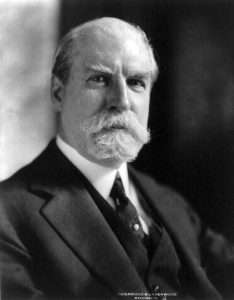The Volokh Conspiracy
Mostly law professors | Sometimes contrarian | Often libertarian | Always independent
Today in Supreme Court History: February 24, 1930
2/24/1930: Chief Justice Charles Evans Hughes takes oath.

Editor's Note: We invite comments and request that they be civil and on-topic. We do not moderate or assume any responsibility for comments, which are owned by the readers who post them. Comments do not represent the views of Reason.com or Reason Foundation. We reserve the right to delete any comment for any reason at any time. Comments may only be edited within 5 minutes of posting. Report abuses.
Please to post comments


Tinker v. Des Moines Independent Community School District, 393 U.S. 503 (decided February 24, 1969): being in school does not restrict student’s First Amendment rights (students were told to remove black armbands as protest against Vietnam War); that year I was the only student in my conservative public school displaying a peace symbol (I drew it in big markers on my loose-leaf) so this decision meant a lot to me
Hustler Magazine v. Falwell, 485 U.S. 46 (decided February 24, 1988): First Amendment prohibits Jerry Falwell as a “public figure” from bringing intentional infliction of emotional distress claim against Hustler for “parody” of his life, absent “actual malice” (knowledge of falsity, which you can never prove if it’s a parody) (this case was grossly misrepresented in the movie “People v. Larry Flynt”, and at the time provoked criticism even from noted feminists, who realized that they could be next; Hustler was a disgusting, vile magazine, and though I confess to guilty giggles from the “Chester the Molester” cartoons, its “parody” of Falwell, besides not being funny, was disgusting, vile, and juvenile)
Unicolors, Inc. v. H & M Hennes & Mauritz, LP, 595 U.S. 178 (decided February 24, 2022): inaccurate understanding of law does not invalidate copyright (plaintiff, designer of fabric, had submitted one application covering 31 designs when it should have submitted 31) and conduct fell within Copyright Act’s safe-harbor provision, 17 U.S.C. §411(b)(1)(A); restores verdict in copyright infringement suit
United States v. Hayes, 555 U.S. 415 (decided February 24, 2004): 1996 Gun Control Act prohibited possession by those convicted of misdemeanor domestic violence; applies here to man convicted of battery on his then-wife even though charge for which he pleaded guilty was generic battery
Doe v. Chao, 540 U.S. 614 (decided February 24, 2004): can’t get award in Privacy Act suit if no showing of actual damages (vacating award of $1,000 to plaintiff whose Social Security Number supplied when applying for Black Lung benefits was then printed by Department of Labor in group public hearing notice)
The Supreme Court is so zealous for the First Amendment, it will protect expression which, “besides not being funny, [is] disgusting, vile, and juvenile.”
It’s as if the Supreme Court had the Internet in mind.
"submitted one application covering 31 designs when it should have submitted 31"
Did Baskin Robbins have to do that with its ice-cream flavors?
I'm shocked they didn't uphold the letter of the law on the 31 thing. Usually good faith goofs are reserved for keeping people in jail for accidental unconstitutional searches.
That's an overbid. Being in school does in fact restrict students' First Amendment rights. What it doesn't do is eliminate them.
The Tinker Court did not reach that question. First Amendment rights in school (just like outside school) have certain limits, but those limits were dealt with in later cases.
Sure it did. The effective holding of Tinker was that student speech was protected unless it was likely to cause material interference with school discipline. Obviously the bounds were fleshed out in many later cases (and continue to be!), but the principle was established in Tinker that there were bounds. (To Clarence Thomas's chagrin!)
Ok. Next time around will change “restrict” to “suspend”.
If you want a good laugh at how judges seemed stuck in an early 20th century mindset (some still do), see a case from that era dealing with a dress code for school athletes and citing Tinker, Dunham v. Pulsifer, 312 F. Supp. 411 (D. Vt. 1970): "the Constitution does not stop at the public school doors like a puppy waiting for his master, but instead it follows the student through the corridors, into the classroom, and onto the athletic field"